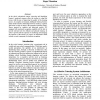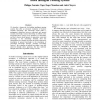333 search results - page 29 / 67 » Game-Driven Intelligent Tutoring Systems |
FLAIRS
2006
13 years 9 months ago
2006
1 In the classic educational context, observing and identifying learner's emotional response allow the teacher to adapt the lesson, with the aim of improving the quality of th...
FLAIRS
2008
13 years 8 months ago
2008
We describe a framework for building intelligent tutoring systems that offer an advanced evaluation of learners' semantic knowledge. The knowledge model makes a pedagogical d...
UM
2010
Springer
13 years 11 months ago
2010
Springer
Abstract. Recent progress has been made by using sensors with Intelligent Tutoring Systems in classrooms in order to predict the affective state of students users. If tutors are a...
UMUAI
2008
13 years 7 months ago
2008
Abstract. Self-efficacy is an individual's belief about her ability to perform well in a given situation. Because selfefficacious students are effective learners, endowing int...
AAAI
2007
13 years 10 months ago
2007
Many intelligent tutoring systems (ITSs) have been developed, deployed, assessed, and proven to facilitate learning. However, most of these systems do not generally adapt to new c...


